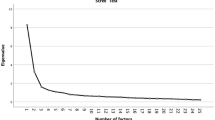Abstract
The Eating Behavior Inventory (EBI) is a self-report instrument for assessing behaviors that have been theoretically implicated in weight loss, e.g., self-monitoring of food intake and of weight, refusing offers of food, eating at only one place, shopping from a list, eating in response to emotions. Thirty items were constructed in the form of first-person statements, e.g., “I eat in the middle of the night.” Each item was to be rated with a 5-point scale according to how often it was true for the respondent. Items were scored such that higher scores always reflected more “appropriate” (theoretically facilitative of weight control) eating patterns. Validity of individual items and total score was assessed in four studies. Twenty-six of the original items appeared valid and were retained. The resulting total score demonstrated validity in these studies and in two cross-validational comparisons. Internal consistency as measured by split-half reliability and correlations of item scores with total score was acceptable. One month test-retest reliability of item and total scores was satisfactory. Clinical and research applications of the EBI are discussed.
Similar content being viewed by others
References
Ferguson, J. M.Learning to Eat: Behavior Modification for Weight Control. Palo Alto, Calif.: Bull Publishing Co., 1975.
Ferguson, J. M.Habits, Not Diets: The Real Way to Weight Control. Palo Alto, Calif.: Bull Publishing Co., 1976.
Mahoney, M. J. The obese eating style: Bites, beliefs, and behavior modification.Addictive Behaviors, 1975,1, 47–53.
Malcolm, R., Riddle, E., Currey, H. S., & Sexauer, J. D. Behavior modification in the management of obesity.South Carolina Medical Journal. 1977,73, 197–199.
O'Neil, P. M., Currey, H. S., Hirsch, A. A., Riddle, F. E., Taylor, C. I., Malcolm, R. J., & Sexauer, J. D. Effects of sex of subject and spouse involvement on weight loss in a behavioral treatment program: A retrospective investigation.Addictive Behaviors, 1979,4, 167–177.
Plutchik, R. Emotions and attitudes related to being overweight.Journal of Clinical Psychology, 1976,32, 21–24.
Stuart, R. B., & Davis, B.Slim Chance in a Fat World. Champaign, Ill.: Research Press, 1972.
Wollersheim, J. P. Effectiveness of group therapy based upon learning principles in the treatment of overweight women.Journal of Abnormal Psychology, 1970,76, 462–474.
Author information
Authors and Affiliations
Rights and permissions
About this article
Cite this article
O'Neil, P.M., Currey, H.S., Hirsch, A.A. et al. Development and validation of the Eating Behavior Inventory. Journal of Behavioral Assessment 1, 123–132 (1979). https://doi.org/10.1007/BF01322019
Accepted:
Issue Date:
DOI: https://doi.org/10.1007/BF01322019



